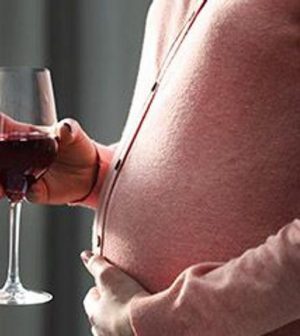- Recognizing the Signs of Hypothyroidism
- 10 Strategies to Overcome Insomnia
- Could Artificial Sweeteners Be Aging the Brain Faster?
- Techniques for Soothing Your Nervous System
- Does the Water in Your House Smell Funny? Here’s Why
- Can a Daily Dose of Apple Cider Vinegar Actually Aid Weight Loss?
- 6 Health Beverages That Can Actually Spike Your Blood Sugar
- Treatment Options for Social Anxiety Disorder
- Understanding the Connection Between Anxiety and Depression
- How Daily Prunes Can Influence Cholesterol and Inflammation
Alcohol Still a Threat in Too Many American Pregnancies: Study

More than half of American babies are exposed to at least some alcohol before they are born — and for 8 out of 10, it happens before their mothers even realize they’re pregnant, according to a Yale University study.
Because alcohol consumption may harm the developing fetus, researchers said their findings underscore the need to promote abstinence in women who are pregnant or trying to become pregnant, as well as preventing unintended pregnancies.
“Finding that more than half of pregnancies that result in a live birth are exposed to alcohol was a big surprise; so we tried to understand [what] is contributing to this,” said Reza Yaesoubi, an assistant professor at Yale School of Public Health’s Department of Health Policy and Management.
“When we consider alcohol-exposed pregnancies, much of the focus is on women who are aware of their pregnancies but may continue to drink,” he said in a university news release. “But what we found in this study is that among pregnancies that are exposed to alcohol, in fact, more than half are exposed while the pregnancy is still unrecognized.”
About 1% to 5% of the U.S. population is affected by fetal alcohol spectrum disorders (FASDs), which can cause lifelong physical, behavioral and intellectual disabilities. Though not every pregnancy that is exposed to alcohol results in a child with FASD, there is no scientifically proven safe threshold for fetal alcohol exposure, the researchers said.
The study suggests that public health organizations not only continue promoting alcohol abstinence among women who are pregnant or want to be but also step up efforts to prevent unintended pregnancies.
Focusing only on abstinence among those who know they are expecting could have at most a 42% reduction in alcohol-exposed pregnancies, compared to an 80% reduction when focusing on unintended pregnancies, according to the study.
The findings are based on a computer simulation model.
Yaesoubi and his team found that 54% of pregnancies that result in a live birth are exposed to at least one alcoholic drink over the nine months. During the gestation period, about 12% are exposed to five or more drinks in a week, and 3% are exposed to nine or more drinks in a week.
The researchers estimated that 80% of the pregnancies unknowingly exposed to alcohol were unintended either due to contraceptive failure or sex without contraception.
The findings were published online June 24 in the journal Medical Decision Making.
More information
The U.S. Centers for Disease Control and Prevention has more on fetal alcohol spectrum disorders (FASDs).
SOURCE: Yale School of Public Health, news release, June 28, 2021
Source: HealthDay
Copyright © 2026 HealthDay. All rights reserved.










